WARNING!!!
These previews contain vital plot
information and other potentially movie-spoiling stuff!
If you don't want to know, read no further!
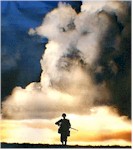 SAVING PRIVATE RYAN
SAVING PRIVATE RYAN
Written by Robert Rodat. Directed by Steven Spielberg. Starring Tom Hanks, Tom Sizemore, Edward Burns, Matt Damon, Jeremy Davies, Vin Diesel, Adam Goldberg, Barry Pepper, Giovanni Ribisi.
Steven Spielberg's storied career reached a zenith in 1993 when he directed SCHINDLER'S LIST, his 'serious' masterpiece about the Holocaust, and JURASSIC PARK, his most successful pure entertainment. SCHINDLER won him his long-awaited, much sought-after Oscar, while JURASSIC put him back on top of the money pile, becoming the highest grossing film of all time (until TITANIC, of course - quit nit-picking). But Spielberg followed these triumphs with THE LOST WORLD: JURASSIC PARK 2 and AMISTAD - trying, perhaps, to repeat the pure pap/serious art one-two punch of a few years earlier. Did it succeed? In a word? No. In two words? Not hardly. In three words? Not fuckin' likely. In four? Well, you get the drift.
In the past few months the buzz surrounding Spielberg's next film, SAVING PRIVATE RYAN, has been bombarding us like a hive of killer bees fresh off the boat from Brazil. It's a World War II drama starring Tom Hanks, and Spielberg reportedly considers it his best work since SCHINDLER. Hell, he's apparently ranking it right up there with SCHINDLER. (Admittedly, he's not going to tell people he ranks it somewhere between 1941 and HOOK, but those are still pretty strong words.) Then word started to leak out from those who'd snagged a look at the script, the consensus being that if the film retained the screenplay's quality, SAVING PRIVATE RYAN could be something pretty special. Well, now your little screenwriter friend here has managed to wrangle a peek at the script. Do I think it's something special?
In a word? Yeah. In two words? You betcha. In three... okay, okay, I'll knock it off.
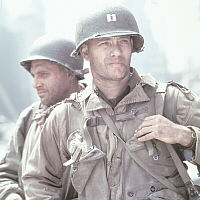
If the film
catches the washed out, gritty atmosphere of this still
then it'll definitely have the right look.
The story follows a squad of Rangers, led by Congressional Medal of Honor winner Captain John Miller, as they take part in the invasion of Omaha beach on D-Day. To say that war is hell, as it's depicted in this script, is a massive understatement. In fact, after storming onshore and taking out a German bunker on the cliffs overlooking the beach, hell might seem like a cool breeze on a hot day. While our boys are risking everything on the front, back in Washington D.C. it's come to the attention of the War Department that two brothers have died in Normandy during the invasion, with a third brother killed in Guam a week earlier - their mother receiving all three telegrams that afternoon. It's also come to their attention that a fourth brother - Private James Ryan - parachuted behind enemy lines with the 101st Airborne. It's decided that a squad must be sent to retrieve Ryan and get him safely back home, and, as Captain Miller is none to happy to learn, his squad of Rangers has been picked for the job. Miller and his men set out to find Private Ryan, who may or may not still be alive. What follows is some of the most realistic sounding dialog and interplay between characters ever seen in a World War II drama. As they trudge through the French countryside, dodging German troops and fighting their way through the hedgerows, we get to know each member of the squad intimately. Their main form of communication is the gripe - but these men have raised the art of complaining to another level. A gripe must be original, well thought out, and preferably darkly humorous, or it's not considered up to military standards. After a series of skirmishes, the Rangers manage to find Private Ryan, who is holed up with what's left of his squad in the town of Ramelle, which is under siege by German troops. This is where the film's climactic battles take place, as Ryan refuses to leave his post, even though it's obvious their position is about to be overrun. Actually, because their position is about to be overrun. The siege of Ramelle is terrifying, exhilarating, and heartbreaking, as one-by-one characters you've grown to care about are killed in battle. Who lives and who dies? Is Private Ryan saved? Go see the film. This is one script I won't reveal the ending to.
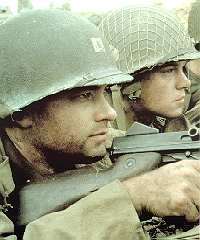
Tom and Matt
staring down German troops.
Outnumbered, outgunned... outrageously cute and cuddly!
This script's enormous appeal lies not in the story - which, to be honest, is pretty standard World War II issue - but in the characters. More importantly, the way the characters behave. These men, even at their most heroic, never cease to act like men in their situation would act. They're scared, pissed off, bleakly funny, and always identifiable. Which is why Tom Hanks, at face value an odd choice for the role of a battle-hardened captain, is actually perfect for the role. Miller leads his men not with an iron fist, but with the gentle-yet-firm guidance of the teacher his character is revealed to be. Miller is the type of character that you'd want to follow into battle (if you, y'know, absolutely had to go), and Hanks has the natural charisma combined with understated authority that the part requires. It's this honest approach to the characters that makes the film seem fresh. One nice touch is the resentment the Rangers have for Private Ryan - resentment which builds to outright hostility as they begin to take casualties on their way to Ramelle. The griping centers more and more on their negative feelings for Ryan, and the mission in general... feelings which are contrasted with the reactions of the troops they meet along the way, all of whom are touched by Ryan's story, and the squad's mission. The Rangers' feelings about Ryan become further conflicted when they meet the young man, and he's just like them - tired, scared, tough, patriotic, and focused on fulfilling his duty. Nothing is simple, perceptions are often wrong, and allegiances come from unexpected places. Just like life.
I've heard some complaints that SAVING PRIVATE RYAN is a Vietnam film disguised as a World War II story. But I didn't see it that way. Many of the films we've seen dealing with Vietnam are violent and raw, from a physical and emotional standpoint. But this has less to do with differences in the two wars than differences in what audiences are ready to see in their movies. All warfare is hellishly violent. All soldiers experience moments of resentment toward the situation they find themselves in. It's universal. It's human. Sheesh, most people gripe and bitch when their boss asks them to put in an hour overtime - imagine how you'd feel toward a boss who tells you to risk your life against overwhelming odds. SAVING PRIVATE RYAN puts its characters in the toughest of situations, and then deals with them honestly, warts and all. Vietnam wasn't the only war with jaded, bitter, scared soldiers. The best war films aren't really about war anyway, they're about the human condition, and how people respond in impossible situations. SAVING PRIVATE RYAN allows us to view its characters in an honest, refreshing way, which is why you care so much about them.
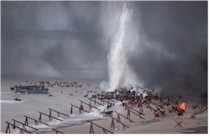
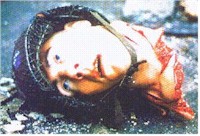
Looks like they've kept that stuff pretty intact, eh?
(Is that head the perfect writer's cameo, or what?) I will state this, though - if Spielberg shot the battle scenes as graphically as they're described in the script, things are gonna get rough, and get rough fast. Here's an excerpt from page two, as the Rangers' landing craft approaches Omaha Beach: THE LEAD LANDING CRAFT The Motorman holds his course. Shells EXPLODE around them. FLAMING OIL BURNS on the water. CANNON FIRE SMASHES into the bow. THE MOTORMAN IS RIPPED TO BITS. BLOOD AND FLESH shower the men behind him. The mate takes the controls. A YOUNG SOLDIER His face covered with the remains of the motorman. Starts to lose it. Begins to shudder and weep. His name is DeLancey. Not exactly 'Fun Time at Party Beach', eh? And DeLancey? Let's just say that this is the last good moment in his life, okay? I'm sure there are some who will balk at the level of violence, especially in a World War II film. After all, we've got a fairly sanitized picture of that war in our subconscious - newsreels of the era didn't figure morale would be boosted by showing the graphic, inevitable human toll that war takes. But for this film to work, to really understand what these men are up against, and to appreciate the magnificence of their sacrifices, we have to have an accurate picture of what the ultimate cost may be. To show violence in films as a clean, bloodless, impersonal experience is irresponsible, to say the least. To fully understand these mens' losses - and more importantly, the losses of real soldiers who participated in battle - you cannot sanitize the brutality they faced. The script (and according to some reports, the film) doesn't shy away from this responsibility. SAVING PRIVATE RYAN is going to be rough, gut-wrenching, and emotional. Just like a war film should be. MY PROGNOSIS? It's gonna take a strong stomach to view this film, and it's not exactly keeping with the light, frothy summer movies surrounding it, but I think SAVING PRIVATE RYAN is going to be a solid hit. The audience can be drawn in by Spielberg and Hanks, and once word-of-mouth spreads about the power of this film, people will realize that real emotions are more rewarding than giant lizards and rocks hurtling from space any day.
AND THE CRITICS SAY...
LA TIMES (Kenneth Turan): "More than any of his other films, and that includes SCHINDLER'S LIST, Steven Spielberg's SAVING PRIVATE RYAN won't leave you alone. To see it is to need to talk about it, to wrestle both with the formidable impact of its unprecedented strengths and the surprising resilience of its niggling weaknesses. A powerful and impressive milestone in the realistic depiction of combat, SAVING PRIVATE RYAN is as much an experience we live through as a film we watch on screen... But even as we're admiring the performances, we can't help but be aware that this kind of multiethnic squad is one of the most venerable conventions of war movies, can't help noticing that, for instance, sharpshooter Jackson could have stepped right out of SERGEANT YORK, the 1941 film about World War I starring Gary Cooper. What nags at you about SAVING PRIVATE RYAN is the way Rodat's script, though solid and well-structured, has not broken through convention, has not elevated itself to a higher level (or even reached the best of the old level) the way the mind-bending scenes of combat have... How much we begrudge SAVING PRIVATE RYAN what flaws it has depends in part on how greedy we are for perfection. When he is on his game, as he is here, Spielberg is a master storyteller whose gift for narrative film is unsurpassed. The overdone sentiment (most noticeable in the film's shaky framing story), the occasional over-reliance on the conventional elements, are simply part of the package, part of what he needs for security if he's going to push mainstream filmmaking into directions it has never gone before. As far as trade-offs go, it's a hell of a deal."
ROGER EBERT: "In Hollywood mythology, great battles wheel and turn on the actions of individual heroes. In Steven Spielberg's SAVING PRIVATE RYAN, thousands of terrified and seasick men, most of them new to combat, are thrown into the face of withering German fire. The landing on Omaha Beach was not about saving Pvt. Ryan. It was about saving your skin... Spielberg and his screenwriter, Robert Rodat, have done a subtle and rather beautiful thing: They have made a philosophical film about war almost entirely in terms of action. SAVING PRIVATE RYAN says things about war that are as complex and difficult as any essayist could possibly express, and does it with broad, strong images, with violence, with profanity, with action, with camaraderie. It is possible to express even the most thoughtful ideas in the simplest words and actions, and that's what Spielberg does. The film is doubly effective, because he communicates his ideas in feelings, not words. I was reminded of ALL QUIET ON THE WESTERN FRONT... SAVING PRIVATE RYAN is a powerful experience. I'm sure a lot of people will weep during it. Spielberg knows how to make audiences weep better than any director since Chaplin in CITY LIGHTS. But weeping is an incomplete response, letting the audience off the hook. This film embodies ideas. After the immediate experience begins to fade, the implications remain and grow." WHILE THE PUBLIC SAYS...SAVING PRIVATE RYAN stormed theatres and brought home $30.1 million, as well as Matt Damon. By the way, settle a bet I have with a friend - is Private Ryan meant to symbolize America? This would make the wrap-around scenes make sense, even if you don't particularly like them. You know, the whole "Am I a good man, have I lived a good life" deal after Hanks' character has told Ryan to "earn" what he's gained through the loss of others' lives. I say yes. My friend says I'm nuts. Is it possible we're both right?
![]() Hunt
and peck to return to the Script Review Archives!
Hunt
and peck to return to the Script Review Archives!
This page hosted by Get your own Free Home Page!